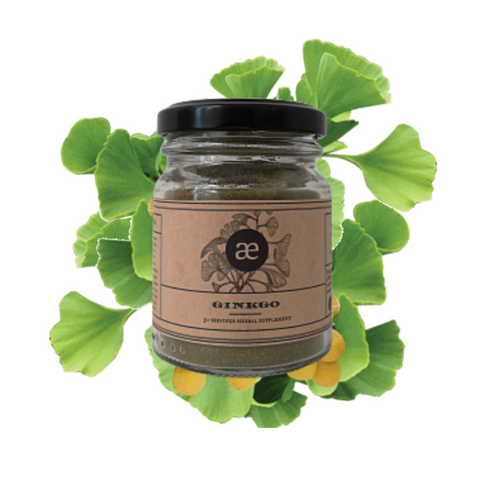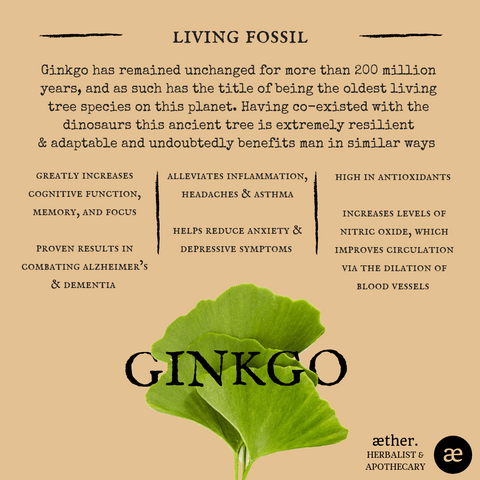PRODUCT INFO
Revered for its beauty and its longevity, the ginkgo is a living fossil, unchanged for more than 200 million years
The genus is the oldest in the world first appearing in the Early Jurassic period. Its numbers blossomed during the Middle Jurassic and Early Cretaceous eras, but suddenly the species crashed around the Paleocene period roughly 65 million years ago, leaving the only Ginkgo trees left on earth isolated to central China, until cultivation began in many monasteries and temple gardens
Mention of ginkgo first appeared in the Han dynasty between 206 BC and 220 AD, however its popularity only began to grow after its use in Chinese literature in the 11th century during the Sung dynasty. After that point, it appeared throughout Chinese art and poetry. Its “fruits” (seeds) and leaves were often praised in literature. Modern documentation was done by the esteemed sage and herbalist Li Shi-Zhen who's compiled an extensive text on herbals called the Compendium of Materia Medica in the 16th century
Ginkgos are revered throughout Asia where this ancient tree has come to symbolize longevity and enlightenment. This venerable tree species is incredibly hardy, with individual trees living as long as 3000 years due to its deep root system, natural disease-resistant bark, and insect-resistant wood.
One of the most famous ginkgo biloba trees is located in Hiroshima. It was growing near a temple that was 1.1 kilometers from the epicenter where the atom bomb was dropped by the American forces during World War II. Disaster rained down upon the city, little was left standing, but somehow a gingko tree was able to weather one of the most destructive moments in human history.
This is due to this trees amazing chemical constituents that have longevity enhancing, anti-mutagenic, free radical scavenging abilities
It is thought that there are two main groups of active constituents responsible for ginkgo's medicinal effects - terpene lactones and ginkgo flavone glycosides. Approximately 40 different flavonoids have been isolated, including ginkgetin, bilobetin, and sciadopitysin as well as a number of powerful terpenes such as ginkgolides and diterpenes, most importantly the ginkgolides A, B, and C have shown significant medicinal benefits in clinical studies.
Ginkgo leaf has shown beneficial effects in treating neurodegenerative diseases like Alzheimer’s, cardiovascular diseases, stress, memory loss, tinnitus, geriatric complaints like vertigo, age-related macular degeneration, and psychiatric disorders like schizophrenia.
Gingkos most notable benefits are in its ability to improve cognitive function and memory. this is due to this herbs potent free radical scavenging and antioxidant properties which play an important role in neuroprotection. Along with increased blood circulation, vital neurotransmitter systems that are considered critical in cognition are thus fortified
Ginkgo can also help protect against cognitive decline and increase brain function, particularly for people with Alzheimer’s (inhibit the formation of Aβ from β-amyloid precursor protein (APP), a crucial process in the pathogenesis of Alzheimer’s disease), dementia or vascular problems caused by cerebral infarction.
The bitter ginkgolides, particularly ginkgolide B are potent inhibitors of excess platelet activating factor (PAF). This reduced PAF along with the flavonoid glycosides found in gingko exert antioxidant effects on delicate cells, reducing injury due to free radical oxidization. This in turn can reduce the risk of atherosclerosis – the leading cause of heart attacks and strokes. Ginkgo has also been found to help maintain the blood flow to the optic nerve whilst protecting it from injury., significant improvement in visual field is found in patients with normal tension glaucoma (NTG)
Ginkgo leaves are extremely resilient and can weather many environmental pollutants, however with this in mind we still believe cleaner is always better. We stock farm grown ginkgo powder to ensure a pollution free product, it can also be found in our focus and energy tincture
The genus is the oldest in the world first appearing in the Early Jurassic period. Its numbers blossomed during the Middle Jurassic and Early Cretaceous eras, but suddenly the species crashed around the Paleocene period roughly 65 million years ago, leaving the only Ginkgo trees left on earth isolated to central China, until cultivation began in many monasteries and temple gardens
Mention of ginkgo first appeared in the Han dynasty between 206 BC and 220 AD, however its popularity only began to grow after its use in Chinese literature in the 11th century during the Sung dynasty. After that point, it appeared throughout Chinese art and poetry. Its “fruits” (seeds) and leaves were often praised in literature. Modern documentation was done by the esteemed sage and herbalist Li Shi-Zhen who's compiled an extensive text on herbals called the Compendium of Materia Medica in the 16th century
Ginkgos are revered throughout Asia where this ancient tree has come to symbolize longevity and enlightenment. This venerable tree species is incredibly hardy, with individual trees living as long as 3000 years due to its deep root system, natural disease-resistant bark, and insect-resistant wood.
One of the most famous ginkgo biloba trees is located in Hiroshima. It was growing near a temple that was 1.1 kilometers from the epicenter where the atom bomb was dropped by the American forces during World War II. Disaster rained down upon the city, little was left standing, but somehow a gingko tree was able to weather one of the most destructive moments in human history.
This is due to this trees amazing chemical constituents that have longevity enhancing, anti-mutagenic, free radical scavenging abilities
It is thought that there are two main groups of active constituents responsible for ginkgo's medicinal effects - terpene lactones and ginkgo flavone glycosides. Approximately 40 different flavonoids have been isolated, including ginkgetin, bilobetin, and sciadopitysin as well as a number of powerful terpenes such as ginkgolides and diterpenes, most importantly the ginkgolides A, B, and C have shown significant medicinal benefits in clinical studies.
Ginkgo leaf has shown beneficial effects in treating neurodegenerative diseases like Alzheimer’s, cardiovascular diseases, stress, memory loss, tinnitus, geriatric complaints like vertigo, age-related macular degeneration, and psychiatric disorders like schizophrenia.
Gingkos most notable benefits are in its ability to improve cognitive function and memory. this is due to this herbs potent free radical scavenging and antioxidant properties which play an important role in neuroprotection. Along with increased blood circulation, vital neurotransmitter systems that are considered critical in cognition are thus fortified
Ginkgo can also help protect against cognitive decline and increase brain function, particularly for people with Alzheimer’s (inhibit the formation of Aβ from β-amyloid precursor protein (APP), a crucial process in the pathogenesis of Alzheimer’s disease), dementia or vascular problems caused by cerebral infarction.
The bitter ginkgolides, particularly ginkgolide B are potent inhibitors of excess platelet activating factor (PAF). This reduced PAF along with the flavonoid glycosides found in gingko exert antioxidant effects on delicate cells, reducing injury due to free radical oxidization. This in turn can reduce the risk of atherosclerosis – the leading cause of heart attacks and strokes. Ginkgo has also been found to help maintain the blood flow to the optic nerve whilst protecting it from injury., significant improvement in visual field is found in patients with normal tension glaucoma (NTG)
Ginkgo leaves are extremely resilient and can weather many environmental pollutants, however with this in mind we still believe cleaner is always better. We stock farm grown ginkgo powder to ensure a pollution free product, it can also be found in our focus and energy tincture
INGREDIENTS AND DOSAGE
Ginkgo Powder
Ginkgo biloba
± 60g - 70g
Take ½ teaspoon once a day
up to 3 teaspoons for chronic ailments
PRECAUTIONS
Ginkgo is a safe supplement for most people.
However, certain individuals should not take it, including pregnant and breastfeeding women.
If you are uncertain about herbal interactions consult your health care provider before use




